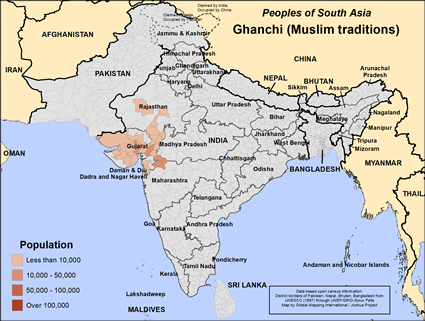Ghanchi (Muslim traditions) in India

Photo Source:
Anonymous
|

Map Source:
People Group data: Omid. Map geography: UNESCO / GMI. Map Design: Joshua Project.
|
| People Name: | Ghanchi (Muslim traditions) |
| Country: | India |
| 10/40 Window: | Yes |
| Population: | 125,000 |
| World Population: | 125,000 |
| Primary Language: | Gujarati |
| Primary Religion: | Islam |
| Christian Adherents: | 0.00 % |
| Evangelicals: | 0.00 % |
| Scripture: | Complete Bible |
| Ministry Resources: | Yes |
| Jesus Film: | Yes |
| Audio Recordings: | Yes |
| People Cluster: | South Asia Muslim - other |
| Affinity Bloc: | South Asian Peoples |
| Progress Level: |
|
Introduction / History
Ghanchi (aka. Gaanchi) people by tradition manufacture cooking oil. They came with the Mongols when they invaded to supply oil for the army. They later came to live in Gujarat.
Where Are they Located?
Ghanchi people live in Gujarat, Mumbai, and Rajasthan in India.
What Are Their Lives Like?
In Rajasthan, the Ghanchi name supposedly came from "ghanch" meaning a traditional oil pressing machine. They get the cooking oil from seeds. Many work in oil pressing and agriculture. Many have become businessmen and work in transportation. Some have moved to Mumbai where there are more job opportunities.
Ghanchi Muslims are a close community, marrying near relatives.
They speak Urdu and Hindi. In Mumbai the Kadiwal Muslim Ghanchi Community Hall helps the Ghanchi community to come together. They have a caste association for the entire state.
What Are Their Beliefs?
The Ghanchi are Sunni Muslims.
What Are Their Needs?
The greatest need of the Ghanchi people is to know the one true God who loves them and paid the full penalty for all their sins.
Audio and visual Bible resources exist in the Urdu and Hindi languages. Someone needs to reach Ganchi people with these resources.
Prayer Points
Please pray that believers will go to the Ghanchi Muslim people in friendship and love and earn the privilege to give them the gospel message.
Pray that existing Indian churches will produce many disciples among Ghanchi people.
Pray for a disciple-making movement to emerge among this community.